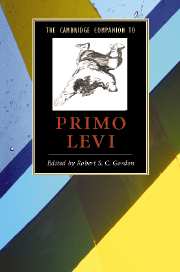5 - Appropriating Primo Levi
from Part II: - The Holocaust
Published online by Cambridge University Press: 28 November 2007
Summary
Although Primo Levi is now firmly established as one of the essential voices of 'The Age of Camps', in Zygmunt Bauman's grim description of the twentieth century, his canonization is a relatively recent occurrence. Levi did not acquire a mass readership, outside of Italy, until the mid-1980s. In early specialist studies of Holocaust literature, he was universalized as one among many who 'speaks a common truth, one known to all writers of the Holocaust'. It was only after the 1984 translation of The Periodic Table (Il sistema periodico, 1975) in the United States that he was transformed into a global figure and gained a large international readership. This transformation contrasts starkly with Levi's own unease in The Drowned and the Saved (I sommersi e i salvati, 1986) about the stereotypical representations of the Holocaust which had increasingly appropriated his life and work. In fact, Levi was a particularly unenthusiastic employer of the term'Holocaust': 'I use this term “Holocaust” reluctantly because I do not like it. But I use it to be understood. Philologically, it is a mistake.' As his biographers have noted, he was also especially uncomfortable at being categorized principally as a 'Jewish writer' in the United States: '“They put a label onme”, he stated in one public lecture, “I don't like labels. Germans do.”'
As Marco Belpoliti has rightly argued, Levi's most consistent self-image in his interviews was as a 'hybrid' or 'centaur' which 'does not only represent the presence of opposites, but also . . . an unstable union destined to break down' (Voice of Memory, p. xx). This creative instability can be found in Levi's complex identity as chemist and writer, witness and writer, Jew and Italian, as well as his always 'impure' narrative voice with its self-conscious 'hybrid input' (The Search for Roots (La ricerca delle radici, 1981), p. 3; OII, 1361) of differing kinds of materials: poetry, testimony, science and fiction.
- Type
- Chapter
- Information
- The Cambridge Companion to Primo Levi , pp. 67 - 86Publisher: Cambridge University PressPrint publication year: 2007
- 5
- Cited by

